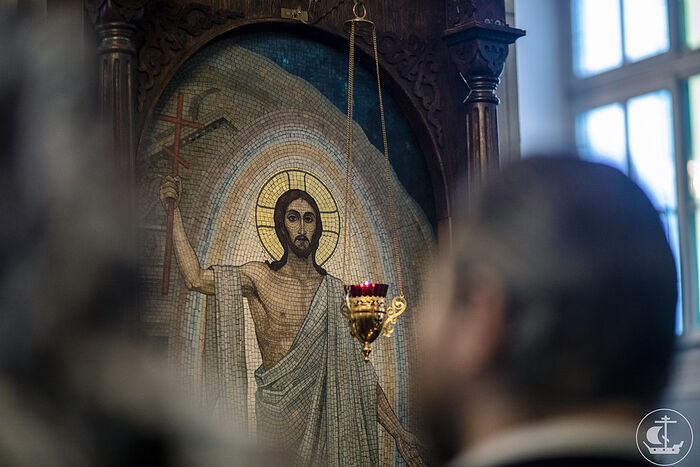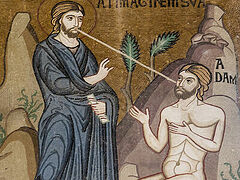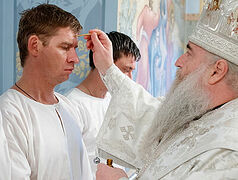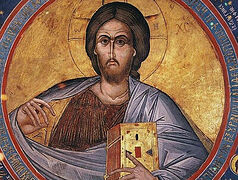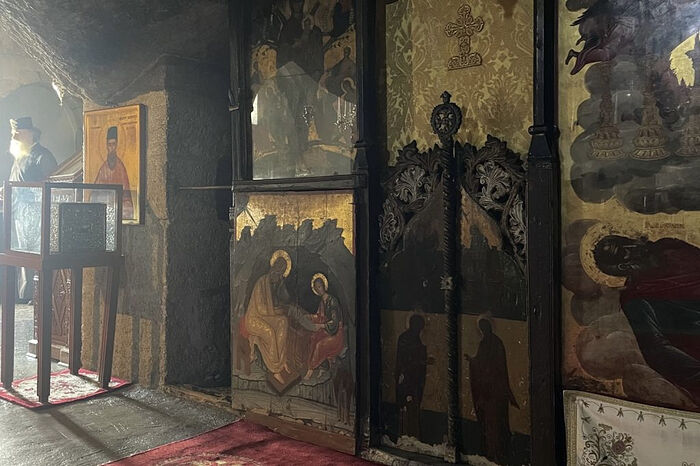 Cave of the Apocalypse, Patmos Island
Cave of the Apocalypse, Patmos Island
His head and his hairs were white like wool, as white as snow; and His eyes were as a flame of fire (Rev. 1:14). The Prophet Daniel described the same thing when he saw the Ancient of Days (he saw Christ).
Of course, we shouldn’t think that Christ or God the Father has white hair. Nothing of the sort—because God is spirit. But God appeared in a way that the Apostle John could see this image and describe it as having a profound meaning.
Thus, the Ancient of Days appears, God Himself, who spoke to the Prophets, with the Prophet Daniel, who wonderfully described the same vision. His hair was white, like snow, and his eyes like a flame of fire. He described what he saw. And his feet like unto fine brass, as if they burned in a furnace; and His voice as the sound of many waters (Rev. 1:15). This brass, “χαλκολιβανον,” is an alloy of that era with the addition of gold and silver—a precious, durable metal. When it was heated in the oven, it was all aflame. The feet of the Lord were like this metal, glowing in the fire.
You know that visions from God are always whole, complete—they’re never half-hearted. But in visions from satan, there’s always something missing; they’re not long-lasting, they flicker. Visions from God are long-lasting; there are never any omissions in them, like something missing. Those who see satanic visions always miss something; there’s always something missing in them. They’re short and the images are constantly changing. The works of God have a duration, and they’re completed, therefore the Apostle John describes a vision here that he beheld for an extended period of time. His voice was like the sound of many waters, like a roaring sea filling everything with sound; a voice was heard speaking to him. Imagine this amazing vision that the Apostle John beheld!
And He had in His right hand seven stars: and out of His mouth went a sharp twoedged sword: and His countenance was as the sun shineth in His strength (Rev. 1:16). The double-edged sword coming from the mouth of Christ symbolizes the word of God that runs through the human heart. His face shone like the sun in its full strength at the moment. Such an amazing vision was revealed to the Apostle and Evangelist John the Theologian. And then Christ explains to him what he saw.
In verse 17, he says: And when I saw Him, I fell at His feet as dead. And He laid His right hand upon me, saying unto me, Fear not; I am the First and the Last (Rev. 1:17). What person could see and withstand this? The Apostle refers here to the right hand of God. Therefore, we cross ourselves with our right hand, which is considered the hand of blessing. The Lord put His right hand on the Apostle and said: Fear not; I am the First and the Last.
God removes man’s fear. The works of God have no fear in them. A man might feel fear momentarily—it’s in our nature, but God takes this fear away from him. When God acts, there should be no fear. There is love, there is peace in the human soul, but fear departs.
What do the words “First and Last” mean? It means everything. The beginning and the end. “There’s nothing outside of Me. I am everything—the First and the Last. And He that liveth (Rev. 1:18)—He Who exists, Who lives.
And was dead; and, behold, I am alive for evermore, Amen; and have the keys of hell and of death (Rev. 1:18). “As man, I died, and now I am alive unto the ages of ages. I live and exist in endless eternity. I hold the keys of death and hell in My hands.”
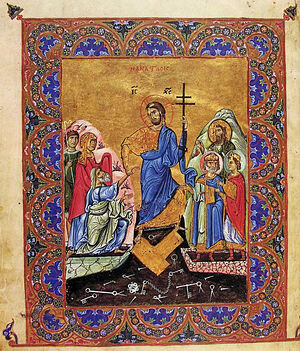 Miniature from the Gospel of Emperor Nikephoros II Phokas, 11th century We see the Almighty God Who became man for us and gave Himself for us, and we can live, having a relationship of absolute love with God. If I love God and feel Him to be my Father, then nothing can frighten my being, not even death itself if I’m united with God (despite my sin), Who has unlimited power and extends everywhere and always.
Miniature from the Gospel of Emperor Nikephoros II Phokas, 11th century We see the Almighty God Who became man for us and gave Himself for us, and we can live, having a relationship of absolute love with God. If I love God and feel Him to be my Father, then nothing can frighten my being, not even death itself if I’m united with God (despite my sin), Who has unlimited power and extends everywhere and always.
In verse 19, He continues: Write the things which thou hast seen, and the things which are, and the things which shall be hereafter (Rev. 1:19). “Write it all down.” And, in verse 20, He explains: The mystery of the seven stars which thou sawest in My right hand, and the seven golden lampstands. The seven stars are the angels of the seven Churches: and the seven lampstands which thou sawest are the seven Churches (Rev. 1:20).
What you saw in the form of seven stars are the angels of the seven Churches, about whom He further explains that they’re not angels, ministering spirits, but the bishops of the Churches; so further He will refer to them thus: “Unto the angel of the Church of Ephesus, unto the angel of the Church of Laodicea, unto the angel of the Church of Pergamos…” They are the bishops of the Churches, whom God, the Holy Spirit, gives to every Church to be His angels. Why are they angels of God? Because the bishop has a commandment from God to convey His will to the people of God, to teach the people of God. Therefore, a bishop’s first and main task is to teach the word of God. This is what bishops must deal with first of all. Therefore, a bishop is an angel of God, proclaiming the will of God, the word of God, the Kingdom of God.
Thus, these seven stars in the hands of Christ are the seven bishops of the Churches. And the seven golden lampstands are the seven Churches whom the Holy Spirit is addressing. In Dionysiou Monastery and other monasteries, the fathers depicted all these scenes: Christ amidst the seven lampstands holding seven stars in His hands, with a double-edged sword coming out of His mouth and the Apostle John falling prostrate before Him, as if dead.
Jesus Christ begins to speak with the bishops of the seven Churches. These are very important words from Christ; important and terrible for all of us and for the clergy, the bishops, who bear great responsibility from God. We hope that God will have mercy upon us and forgive us. But what can you do if God wanted people to serve in the Churches, not angels?
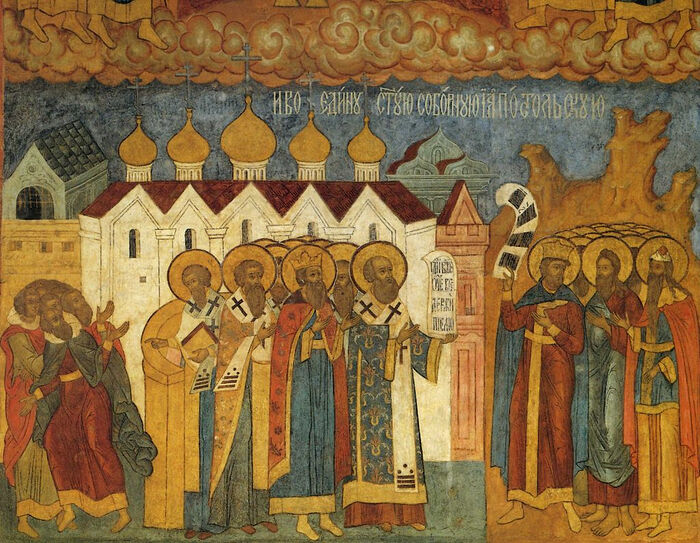 Fresco on the western wall of the Archangel Cathedral in the Moscow Kremlin
Fresco on the western wall of the Archangel Cathedral in the Moscow Kremlin
Let’s move on to chapter 2: Unto the angel of the Church of Ephesus write; These things saith He that holdeth the seven stars in His right hand, who walketh in the midst of the seven golden lampstands (Rev. 2:1). Write to the bishop of the Ephesian Church what the One holding stars in His right hand says. What do His words “saith He” remind us of? Of how the Lord spoke in the Old Testament: Thus saith the LORD (Is. 43:1). Only God can utter this phrase, so when the Jehovah’s Witnesses say Christ isn’t God, Revelation fundamentally refutes this, because in Revelation, Christ speaks and reveals Himself exactly like God in the Old Testament. Only He can say thus saith the Lord. Only He can reveal Himself in the same way as the Lord revealed Himself to the Prophet Daniel.
It goes on to say that the Lord walks in the midst of the seven Churches. The greatest miracle is that the Church exists. Do you realize this? There is no greater miracle. I’m telling you this as a cleric and bishop. If it weren’t God Who established the Church, it would not only have fallen apart, but we all would have been hanged in the squares. We have all the prerequisites for a disaster. We present the worst image to the outside world; and things happen that are difficult for a man to imagine. If we were only a human organization, it would have fallen apart long ago, without a doubt. And they would have put us in jail, too. But the fact that the Church still exists, upholding and saving the world to this day, is God’s greatest miracle, at least for the Orthodox Church. Therefore, the Lord walks among the Churches, holding the seven stars of these Churches in His hands. And we shouldn’t worry too much about the Church. We don’t save the Church. The Church saves us. We don’t protect the Church; the Church protects us and intercedes for us. Christ protects the Church, which He established with His holy Blood.
Thus, he says to the bishop: I know thy works, and thy labour, and thy patience, and how thou canst not bear them which are evil: and thou hast tried them which say they are apostles, and are not, and hast found them liars: And hast borne, and hast patience, and for My Name’s sake hast laboured, and hast not fainted (Rev. 2:2-3). The Lord says that He knows his works, and talks with the bishop. This is a striking text. The Lord says He knows about his patience, his daily labors for the Church, his torments, sufferings, fatigue, and his many deeds; that he doesn’t associate with the depraved who fight against the works of God, that he doesn’t want to help them, that he tests those who want to be called apostles, showing that they’re false apostles. The bishop had works, labors, patience; he didn’t associate with the evil and depraved, didn’t participate in their works; he didn’t accept false apostles.
The third verse says the bishop endured a lot for the sake of the name of God, but didn’t become exhausted in his many labors. He didn’t say: “Forgive me, but I’m tired of this. I can’t be tormented anymore; I can’t suffer or endure any more in the name of Christ.” That is, he was a bishop who accomplished many things in his patience, who endured many sorrows and much confrontation, and never murmured.
But what does the Lord say to him? We read in verse 4: Nevertheless I have somewhat against thee. You can do works, you can be good, not accept lies, and have great patience, but I have somewhat against thee. And then: because thou hast left thy first love (Rev. 2:4). This affects all of us. Do you see what God says? “You’ve left your first love. You aren’t the same as you were in the beginning. When you began, you had much more love. Now, you’ve left it behind.”
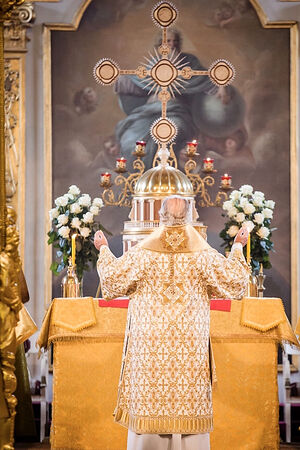 All of us, if we turn back, will be exposed by these words. Let’s remember what kind of zeal we had in our youth. What kind of love for God burned within us? How much effort have we put into loving God? Unfortunately, time, age, conditions, daily cares, the devil, our evil deeds and sins have cooled our love for God; they’ve frozen it. God doesn’t want this, and we must concern ourselves with it. All of us, when we came to the Church, came with fervent zeal, but along the way, the devil managed to cool our love, to drop the temperature. Instead of growing in love, we have diminished it.
All of us, if we turn back, will be exposed by these words. Let’s remember what kind of zeal we had in our youth. What kind of love for God burned within us? How much effort have we put into loving God? Unfortunately, time, age, conditions, daily cares, the devil, our evil deeds and sins have cooled our love for God; they’ve frozen it. God doesn’t want this, and we must concern ourselves with it. All of us, when we came to the Church, came with fervent zeal, but along the way, the devil managed to cool our love, to drop the temperature. Instead of growing in love, we have diminished it.
Further in verse 5, He continues: Remember therefore from whence thou art fallen, and repent, and do the first works; or else I will come unto thee quickly, and will remove thy candlestick out of his place, except thou repent (Rev. 2:5). Thus, Christ tells him: “You have so many good things, but you left your first love; you lost it, so remember where you fell from—where you were and where you fell to.”
And how can we go back, to God? Repent. Start those first things you did again. As our ever-memorable Geronda said: “Enter back through the door from which you fell.” Go back where you came from. If you were repelled from that love, say, by hedonism, then return through abstinence; if avarice led you astray, enter again through charity; if laziness took you away – come back by labors. Find the reason why you fell away and left that first love.
Repent, grieve over this, change your way of thinking, remember your first works that you did in the beginning, and do them now. They’ll save you. Remember how you labored then, and do it now. At least grieve with your soul that you can’t do these works anymore. “I used to stand vigil all night, but now my back knees, and feet hurt.” We say that diseases begin after fifty. All this has affected me too. After fifty, my legs and back began to hurt; I can’t endure standing in church now; I started talking pills. Let us at least repent; let us be contrite about it and say: “God, take pity upon me, that I’m so weak.”
It’s like God is saying: “If you don’t repent, then I’ll come to you soon and remove your lampstand.” He will create an earthquake to wake you up. What does this mean? Temptations, sorrows, obstacles—anything you can imagine. “I’ll remove your lampstand and maybe you’ll wake up, you’ll come to your senses.” You’ll say: “Where did I fall from? Where was I, and where am I now? How was I living when I came to the Church, and how am I living now? At least I’ll repent.”
And then, so as not to completely deprive a man of hope, God tells him, as if giving him fruit for consolation: But this thou hast, that thou hatest the deeds of the Nicolaitanes, which I also hate (Rev. 2:6). He didn’t say, “you hate the Nicolaitanes,” who were heretics, disciples of Deacon Nicholas, one of the seven deacons chosen by the Holy Spirit. This Deacon Nicholas became a heretic, a heresiarch. A deacon of the Church, whom God Himself chose for ministry, went so far astray that God says: “I hate his works.”
Why did God hate his works? Because Deacon Nicholas taught that people can attain theosis by giving themselves over unrestrainedly to carnal passions. It was a delusion, a perversion. Ascetics labor to cut off all this and keep themselves in purity, to achieve theosis. But here he proposed to do everything the opposite way—to ruin the body through boundless devotion to carnal passions. Therefore, the Lord says: “You hate these unrestrained carnal perversions, as I hate them. Because you hate them, you don’t want them, you fight with them, and you teach the people likewise, I love you, and I accept the works that you do.”
You see, He didn’t say He hates the Nicolaitanes. We don’t hate people, brothers and sisters. We don’t nurture hate for heretics; we love them. Heretics are our brothers according the flesh, but not according to the spirit. We love them and desire salvation for them; we want them to know God, but we don’t accept their deeds, their sins. We hate sinful deeds, but we love sinners; we don’t experience hatred for them, but we welcome them and help them come to repentance. But we don’t accept sinful deeds. We can’t accept such deeds.
And concluding this message to the bishop of the Church of Ephesus, the Lord says: He that hath an ear, let him hear what the Spirit saith unto the Churches; To him that overcometh will I give to eat of the Tree of Life, which is in the midst of the Paradise of God (Rev. 2:7).
He who overcomes sin in his life overcomes the devil, overcomes himself—the old man. And God will give him to taste of the Tree of Life, which is in the Paradise of God. This is the tree that Adam ate from and fell away from God, which is Christ. Christ is the Tree of Life, and the man who eats of it will not die (cf. Jn. 6:50). Christ says he will give Himself to such a man so he’ll be united with Him. The Tree of Life in the midst of God’s Paradise is Christ Himself. Thus ends the first epistle, addressed to the bishop of the Church of Ephesus.

